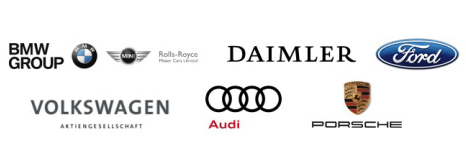BMW Group, Daimler AG, Ford Motor Co. and Volkswagen Group, with Audi and Porsche, have signed a memorandum of understanding to create an ultra-fast, high-powered charging network in Europe.
According to the companies, the goal is to quickly build up a sizable number of stations to enable long-range travel for battery-electric vehicle (BEV) drivers, as this is an important step toward facilitating mass-market BEV adoption.
As reported, the projected ultra-fast charging network with power levels up to 350 kW will be significantly faster than the most powerful charging system deployed today.
The companies expect to start the buildup in 2017, setting an initial target of about 400 sites in Europe. By 2020, consumers should have access to thousands of high-powered charging points, enabling long-distance travel through open-network charging stations along highways and major thoroughfares.
According to the companies, the network will be based on Combined Charging System standard technology. The planned infrastructure expands the existing technical standard for AC and DC charging of electric vehicles to the next level of capacity for DC fast charging. Vehicles engineered to accept the full power of the charge stations can recharge brand-independently in a fraction of the time it takes today’s BEVs.
“This high-power charging network provides motorists with another strong argument to move toward electric mobility,” says Harald Krüger, chairman of the board of management of BMW AG. “The BMW Group has initiated numerous public charging infrastructure projects over the last years. The joint project is another major milestone, clearly demonstrating that competitors are combining forces to ramp up e-mobility.”
“The breakthrough of e-mobility requires two things: convincing vehicles and a comprehensive charging infrastructure. With our new brand EQ, we are launching our electric product offensive; by 2025, our portfolio will include more than 10 fully electric passenger cars. Together with our partners, we are now installing the highest-powered charging infrastructure in Europe,” says Dieter Zetsche, chairman of the board of management of Daimler AG and head of Mercedes-Benz Cars. “The availability of high-power stations allows long-distance e-mobility for the first time and will convince more and more customers to opt for an electric vehicle.”
“A reliable, ultra-fast charging infrastructure is important for mass consumer adoption and has the potential to transform the possibilities for electric driving,” says Mark Fields, president and CEO of Ford Motor Co. “Ford is committed to developing vehicles and technologies that make people’s lives better, and this charging network will make it easier and more practical for consumers across Europe to own electrified vehicles.”
“There are two decisive aspects for us: ultra-fast charging and placing the charging stations at the right positions,” says Oliver Blume, chairman of the executive board of Porsche AG. “Together, these two factors enable us to travel in an all-electrically powered car as in a conventional combustion engine vehicle. As an automobile manufacturer, we actively shape our future not only by developing all-electrically powered vehicles, but by building up the necessary infrastructure, as well.”
The automobile manufacturers intend to make substantial investments to create the network. Although the founding partners – BMW Group, Daimler AG, Ford Motor Co. and Volkswagen Group – will be equal partners in the joint venture, other automobile manufacturers will be encouraged to participate to help establish convenient charging solutions for BEV customers. The joint venture also intends to cooperate with regional partners to ensure a quick network realization.
The joint venture formation is subject to execution of definitive agreements and merger control approval in various jurisdictions.







